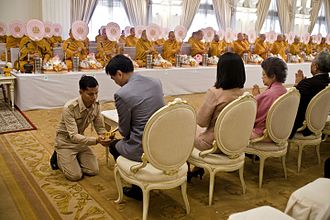Our website is made possible by displaying online advertisements to our visitors.
Please consider supporting us by disabling your ad blocker.
Transfer of merit

| Translations of Transfer of merit | |
|---|---|
| Sanskrit | pariṇāmanā |
| Pali | pattidāna |
| Chinese | 迴向 (Pinyin: huí xiàng) |
| Japanese | 回向 or 廻向 (Rōmaji: Ekō) |
| Tibetan | བསྔོ་བ་ (bsngo ba) |
| Thai | อุทิศบุญกุศล |
| Vietnamese | hồi hướng |
| Glossary of Buddhism | |
Transfer of merit (Sanskrit: pariṇāmanā,[note 1] Pali: pattidāna or pattānumodanā)[3][note 2] is a standard part of Buddhist spiritual discipline where the practitioner's merit, resulting from good deeds, is transferred to deceased relatives, to deities, or to all sentient beings.
Such transfer is done mentally, and it is believed that the recipient can often receive this merit, if they rejoice in the meritorious acts of the person transferring. In Buddhism, merit transfer is seen as a better alternative than mourning.
Scholars have discussed how the doctrine of transfer of merit can be reconciled with the individual nature of karma in Buddhism. Some scholars believe that the idea originates with early Buddhism, whereas others suspect a later origin.
In Buddhism, such worship was given an ethical emphasis. The doctrine may also have been influenced by pre-Buddhist ideas of transference of powers. In Mahāyāna Buddhism, transfer of merit became an essential aspect of the ideal of the bodhisattva, the Buddha-to-be, who uses his merits to help all living beings.
Transfer of merit is widely practiced in all Buddhist countries, in ceremonies, festivals, and daily practice. In the present day, transfer of merit has become an intrinsic part of Buddhism and has an important social function.
- ^ Cite error: The named reference
Calkowski 2006was invoked but never defined (see the help page). - ^ Hardacre 2014, p. 128.
- ^ Hara, Minoru (2002) [1994]. "Transfer of Merit in Hindu Literature and Religion". In Takashima, Jun (ed.). Minoru Hara Pasupata Studies. Motilal Banarsidass. p. 137. ISBN 3-900271-35-6.
- ^ Gombrich 1971, pp. 215–219.
Cite error: There are <ref group=note> tags on this page, but the references will not show without a {{reflist|group=note}} template (see the help page).
Previous Page Next Page


